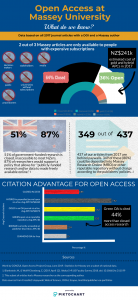Open Access – A review on the current state of OA at Massey
March 19, 2020
This post is the second of two relating to the current state of Open Access in New Zealand. The first is here.
Massey University’s data was extracted from the national sample and analysed in the same way and found that two thirds of Massey-authored articles are behind paywalls, missing out on the 44% more citations that open access can give – and 80% of these could be made open access at no cost to the authors, according to recent research.
Building on the work of a project sponsored by the Council of NZ University Librarians (CONZUL) to review the current state of Open Access (OA) in New Zealand, a refined analysis of 2017 articles by Massey University researchers has informed a Massey-specific infographic (below).
OA refers to free, unrestricted, online access to research outputs, although can extend to open scholarship (encompassing anything from open data to open educational resources.
The focus of the CONZUL report was access to research publications, specifically journal articles from 2017 with a DOI (Digital Object Identifier).
Key findings:
- Research articles in open repositories (such as Massey Research Online) which can be accessed by anyone, are cited 44% more often than articles behind paywalls (accessible only to researchers whose institutions pay subscriptions to the journals)
- The majority of closed articles (80%) from 2017 can be made openly available, at no cost to the researcher, through institutional repositories (also know as Green OA or “Repository Open Access”)
Further information about Open Access can be found in the appendix 2 of the Library’s October 2019 Report to Library Committee
The original “all of NZ” infographic NZ Open Access: What do we know?
Open Access in New Zealand universities: an environmental scan [August 2019]
2 responses to “Open Access – A review on the current state of OA at Massey”
Leave a Reply
Search posts
Categories
Tags
Recent Comments
- January 2026
- November 2025
- September 2025
- May 2025
- April 2025
- March 2025
- February 2025
- January 2025
- December 2024
- November 2024
- October 2024
- September 2024
- August 2024
- July 2024
- June 2024
- May 2024
- December 2023
- November 2023
- October 2023
- September 2023
- June 2023
- May 2023
- February 2023
- January 2023
- November 2022
- October 2022
- September 2022
- August 2022
- July 2022
- June 2022
- May 2022
- March 2022
- January 2022
- November 2021
- August 2021
- July 2021
- May 2021
- April 2021
- March 2021
- December 2020
- November 2020
- September 2020
- August 2020
- June 2020
- May 2020
- April 2020
- March 2020
- February 2020
- November 2019
- October 2019
- September 2019
- July 2019
- June 2019
- May 2019
- March 2019
- February 2019
- December 2018
- November 2018
- October 2018
- September 2018
- August 2018
- July 2018
- June 2018
- May 2018
- April 2018
- March 2018
- February 2018
- January 2018
- December 2017
- November 2017
- October 2017
- September 2017
- August 2017
- July 2017
- June 2017
- May 2017
- April 2017
- March 2017
- February 2017
- January 2017
- December 2016
- November 2016
- October 2016
- September 2016
- August 2016
- July 2016
- June 2016
- May 2016
- April 2016
- March 2016
- February 2016
- January 2016
- December 2015
- November 2015
- October 2015
- September 2015
- August 2015
- July 2015
- June 2015
- May 2015
- April 2015
- March 2015
- February 2015
- January 2015
- December 2014
- November 2014
- October 2014
- September 2014
- August 2014
- July 2014
- June 2014
- May 2014
- April 2014
- March 2014
- February 2014
- January 2014
- December 2013
- November 2013
- October 2013
- September 2013
- August 2013
- July 2013
- June 2013
- May 2013
- April 2013
- March 2013
- February 2013
- January 2013
- December 2012
- November 2012
- October 2012
- September 2012
- August 2012
- July 2012
- June 2012
- May 2012
- September 2009
- November 2008


When you publish with a journal you sign a very comprehensive copyright agreement which I have assumed gives away my right to offer that article’s content on an open access basis. Clarification on that would be appreciated.
It has been suggested that we make the draft of an article available instead but if we do that it is difficult to see how this does not breach copyright given it may be little different to the published version.
Equally do other researchers really cite a draft of an article, given that that version will not be the peer reviewed version?
If open source journals are being cited and used more then isn’t the answer to make funding available for staff to publish that way?
You bring up some good points.
The Copyright Transfer Agreement often allows for a version of the article to be made open access. You can check the journal requirements on Symplectic when uploading articles.
Researchers are able to cite the published version, even when using the OA one.
The OA funding models are evolving quickly and there are several options. The Library doesn’t provide funding for the paid models, but does have a free platform – Massey Research Online. For more on how to use this please see Open Access Publishing with Massey Research Online.
If you would like further help with this, please contact your Subject Librarian